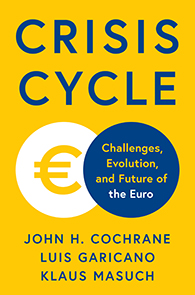Europe’s policymakers must not rely on the next crisis to force reform to the single currency
Crisis Cycle: Challenges, Evolution, and Future of the Euro
John H. Cochrane, Luis Garicano, and Klaus Masuch
Princeton University Press
Princeton, NJ, 2025, 328 pp., $35
The euro is at the core of the European project, but its future is far from assured. Introduced more than 25 years ago, it has survived one crisis after another, and its rules and institutions have changed along the way. Yet these changes to the functioning of European monetary union form a poor long-term basis for institutions. They have spawned ever larger and less constrained monetary and fiscal interventions and sown the seeds for even worse future crises.
This is the sobering diagnosis of Crisis Cycle, a new book on the euro’s evolution by a unique trio: Stanford University’s John Cochrane, a leading scholar of monetary and fiscal matters; Luis Garicano, once a member of the European Parliament, now at the London School of Economics; and Klaus Masuch, whose lifetime career in the European Central Bank’s engine rooms of monetary policy and crisis management included work with the “troika” that negotiated the Greek adjustment program after the 2010 debt crisis.
Crisis Cycle is not a dense equation-filled treatise aimed at specialists. Its easy-to-read conversational style is accessible to anyone interested in the economic and political drivers of institutional change.
Starting with an overview of key economic ideas and the initial design of the European Economic and Monetary Union, the book then covers the global financial crisis, the euro debt crisis, institutional reforms, zero interest rates with asset purchases and subsidized loans, and the policy response to the pandemic and subsequent inflation surge and decline.
The status quo is not sustainable, the authors argue. In a currency union without fiscal union, overindebted countries must be left to default like companies. If the central bank always steps in to prevent default or rising bond yields in fear of default, countries lose the incentive for fiscal responsibility: Frequent interventions and recurrent inflation are sure to follow.
While the euro’s founders appreciated the importance of incentives for responsible macroeconomic policymaking, the initial design was incomplete. Cochrane, Garicano, and Masuch propose a package of reforms to be implemented sooner rather than later—and preferably in calm times, not amid the next crisis.
They call for the ECB’s release from the problems surrounding sovereign debt and propose a framework for orderly sovereign default and debt restructuring—to be applied as soon as sovereign problems arise and complemented by regulation that reduces banks’ exposure to sovereign debt and sovereigns’ exposure to banks.
A strong European fiscal and political institution, the authors say, will offer temporary financial and balance of payments support in a crisis—even to the largest euro area economies—and strict conditions to achieve fiscal and microeconomic reform. A strengthened and revitalized version of the European Stability Mechanism, the euro area’s existing rescue fund, could work.
National sovereign debt should be long rather than short term. The supply of truly European sovereign debt should be increased, and the ECB should not intervene in the market for national sovereign debt, the authors say.
Crisis Cycle is an urgent warning to Europe’s policymakers not to rely on the next crisis to force much-needed reform. Now is the time to future-proof the euro, before it’s too late.
Opinions expressed in articles and other materials are those of the authors; they do not necessarily reflect IMF policy.










